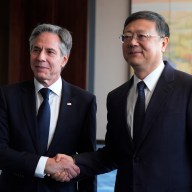OTTAWA – Canada’s seat at the United Nations will be empty during today’s speech by Iranian President Mahmoud Ahmadinejad.
Canada will not attend Ahmadinejad’s address to the UN General Assembly in New York, said a spokeswoman for Foreign Affairs Minister Lawrence Cannon. “Canada’s seat at the UN will be vacant during the Iranian president’s speech,” Catherine Loubier said.
The Iranian president denies the Holocaust, harbours “hostile views towards our democratic ally Israel” and continues to violate the human rights of his own people, Loubier said.
“President Ahmadinejad’s repeated denial of the Holocaust and his anti-Israel comments run counter to the values of the UN General Assembly and are shameful,” she said by email.
“It is clear that President Ahmadinejad uses his public appearances to provoke the international community and Israel. Canada does not tolerate such unacceptable behaviour.”
Iran’s pro-reform opposition has staged dramatic protests since Ahmadinejad was re-elected in June, claiming the vote was fraudulent. The Iranian government waged a bloody crackdown and opposition groups say at least 72 protesters were killed.
Government officials maintain that only 36 people died, and Ahmadinejad repeated that claim in an interview with The Associated Press on Tuesday. Hundreds more have been jailed.
Ahmadinejad told AP those who died were “not at fault.” He blamed Iranian opposition politicians and “European and American politicians” who, he said, fuelled the violence.
Loubier said Canada will continue to demand the release of those “unjustly detained” in Iran, including Maziar Bahari, an Iranian-Canadian reporter working for Newsweek.
Bahari was imprisoned while covering the election unrest.
Ahmadinejad said in the AP interview that three Americans detained in Iran for 53 days illegally entered the country when they went off course while hiking in northern Iraq in July.
Nevertheless, he said he will ask the Iranian judiciary to treat the case with “maximum lenience.”
Ahmadinejad also was asked about Bahari but he did not reply. The ambassador at Iran’s UN mission, Mohammad Khazee, later said he hoped Bahari’s case would also be resolved.
Canada and Iran have been involved in a diplomatic row since Zahra Kazemi, an Iranian-Canadian photojournalist from Montreal, died in Iranian custody in 2003 after she was tortured and beaten.
Wednesday’s move by Cannon and his delegation is somewhat muted by the absence of Prime Minister Stephen Harper, who has not addressed the UN General Assembly in three years, even though Canada is seeking a Security Council seat.
In 2006 – eight months after he was first elected – Harper lauded Canada’s role in the UN-sanctioned war in Afghanistan and called the mission “vital to the health and future” of the United Nations.
However, in a thinly veiled criticism of the UN, he said the difficulties Canadians face in Afghanistan “don’t daunt us. But lack of common purpose and will in this body would.”
He questioned UN commitment, not only in Afghanistan but elsewhere, citing “challenges” in Haiti, Darfur and the Middle East along with human rights.
“Will the new Human Rights Council become a forum where human rights are genuinely put above political manoeuvring? Or will it emulate the fate of its failed predecessor organization?” he asked.
“I must tell you, the early signals suggest that too little has changed, that the page has not yet been turned.”
The United Nations, he added, must become “more accountable and more effective.”
Spokesman Dimitri Soudas has said Harper chose to attend G20 meetings in Pittsburgh this week rather than address the General Assembly.
But U.S. President Barack Obama, host of the G20 meeting, and British Prime Minister Gordon Brown, both addressed the UN.
Cannon is scheduled to speak to the 192-member body on Saturday evening – well out of the primetime spotlight.
In contrast to former prime minister Jean Chretien, who famously cited the absence of UN approval for Canada’s refusal to participate in the Iraq war, Harper continues to criticize the UN.
“Instead of polling the United Nations General Assembly to determine Canada’s foreign policy, we have taken a strong and principled stand in favour of freedom, democracy, human rights and the rule of law around the world,” he said in a recent, secretly taped speech to Conservative party faithful.
















